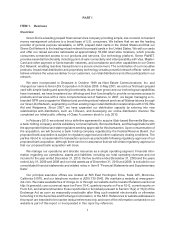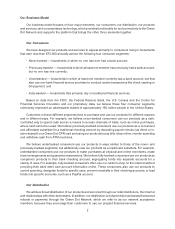Green Dot 2010 Annual Report Download - page 20
Download and view the complete annual report
Please find page 20 of the 2010 Green Dot annual report below. You can navigate through the pages in the report by either clicking on the pages listed below, or by using the keyword search tool below to find specific information within the annual report.• comply with consumer disclosure requirements; and
• register or obtain licenses with state and federal agencies in the United States and seek registration
of our retail distributors and network acceptance members when necessary.
Anti-money laundering regulations are constantly evolving. We continuously monitor our compliance
with anti-money laundering regulations and implement policies and procedures to make our business
practices flexible, so we can comply with the most current legal requirements. We cannot predict how these
future regulations might affect us. Complying with future regulation could be expensive or require us to
change the way we operate our business. For example, in June 2010, the Financial Crimes Enforcement
Network, or FinCEN, of the U.S. Department of Treasury published for comment proposed new rules
regarding, among other things, the applicability of the Bank Secrecy Act’s anti-money laundering pro-
visions to prepaid products such as ours. If adopted as proposed, the rules would establish a more
comprehensive regulatory framework for access to prepaid financial services. As currently drafted, the
proposed rules would significantly change the way customer data, including identification information, is
collected for certain prepaid products (including our cards) by shifting the point of collection from us to our
retail distributors. We believe that, if the rules are adopted as currently proposed, we and our retail
distributors would need to modify operational elements of our product offering to comply with the proposed
rules. If we or any of our retail distributors were unwilling or unable to make any required operational
changes to comply with the proposed rules as adopted, we would no longer be able to sell our cards
through that noncompliant retail distributor, which could have a material adverse effect on our business,
financial position and results of operations. However, as the proposed rules are subject to further comment
and revision, it is difficult to determine with any certainty what obligations the final rules might impose or
what impact they might have on our business or that of our retail distributors.
We are voluntarily registered with FinCEN as a money services business. As a result of being so
registered, we are required to establish anti-money laundering compliance programs that include:
(i) internal policies and controls; (ii) designation of a compliance officer; (iii) ongoing employee training
and (iv) an independent review function. We have developed and deployed compliance programs com-
prised of policies, procedures, systems and internal controls to monitor and address various aspects of
legal requirements and developments. To assist in managing and monitoring money laundering risks, we
continue to enhance our anti-money laundering compliance program. We offer our services largely
through our retail distributor and network acceptance member relationships. We have developed an anti-
money laundering training manual and a program to assist in educating our retail distributors on applicable
anti-money laundering laws and regulations.
Money Transfer and Payment Instrument Licensing Regulations
We are subject to money transfer and payment instrument licensing regulations. We have obtained
licenses to operate as a money transmitter in 39 U.S. jurisdictions. The remaining U.S. jurisdictions either
do not currently regulate money transmitters or have rendered a regulatory determination or a legal
interpretation that the money services laws of that jurisdiction do not require us to obtain a license in
connection with the conduct of our business. As a licensee, we are subject to certain restrictions and
requirements, including reporting, net worth and surety bonding requirements and requirements for
regulatory approval of controlling stockholders, agent locations and consumer forms and disclosures. We
are also subject to inspection by the regulators in the jurisdictions in which we are licensed, many of which
conduct regular examinations.
In addition, we must at all times maintain “permissible investments” in an amount equivalent to all
“outstanding payment obligations.” While, technically, the outstanding payment obligations represented by
the balances on our card products are liabilities of the issuing bank and not us, it is possible that some
states will require us to maintain permissible investments in an amount equal to the outstanding payment
obligations of the bank that issues our cards. The types of securities that are considered “permissible
investments” vary from state to state, but generally include cash and cash equivalents, U.S. government
securities and other highly rated debt instruments.
11
























